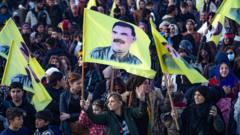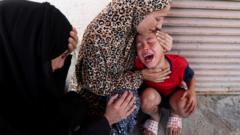The Kurdistan Workers' Party (PKK), long associated with armed resistance against the Turkish government, has officially announced a ceasefire, prompted by the words of its incarcerated leader, Abdullah Ocalan. This declaration comes after Ocalan's recent appeal for an end to the decades-long struggle that has seen a significant loss of life.
Kurdish PKK Announces Ceasefire with Turkey Amid Calls for Peace

Kurdish PKK Announces Ceasefire with Turkey Amid Calls for Peace
The PKK has declared a ceasefire following a message from their leader Abdullah Ocalan, seeking a transition towards peaceful negotiations with Turkey.
In a statement made on Saturday, the PKK expressed its hope that the Turkish government would consider the release of Ocalan from solitary confinement, where he has been kept since 1999, in order to facilitate a process of disarmament. Ocalan's call for peace marks a significant shift from the group's original objective of an independent Kurdish state, aiming instead for autonomy and enhanced rights for the Kurdish population, which constitutes around 20% of Turkey’s population.
The ceasefire is effective immediately, as stated by the PKK's executive committee to the pro-PKK news agency ANF. "None of our forces will take armed action unless attacked," the statement emphasized. President Recep Tayyip Erdogan responded by threatening to resume military operations against the PKK if its commitments are not upheld.
This pivotal moment follows months of dialogue spurred by Turkish officials, including a proposal from Devlet Bahceli, head of the right-wing MHP party, that aimed to foster peace. Abdullah Ocalan, commonly called Apo by followers, met with members of a pro-Kurdish political party recently, reiterating the need for disarmament and political engagement.
Witnesses reported large gatherings among Kurdish communities in cities such as Diyarbakir and Van, indicating public support for Ocalan's initiative. Nonetheless, skepticism persists across both Kurdish and Turkish demographics regarding the future of peace negotiations. Recently, concerns were voiced by senior PKK commanders about the ruling AKP's true intentions in the peace process.
The ongoing conflict, which has spanned over four decades, has claimed approximately 40,000 lives and has sporadically escalated into violence, as demonstrated by incidents like the PKK's recent attack on a Turkish military facility near Ankara.
The latest ceasefire presents a critical juncture for relations between Turkey and its Kurdish population, but fundamental questions about the commitment to peace and the potential for lasting resolution remain unanswered.
The ceasefire is effective immediately, as stated by the PKK's executive committee to the pro-PKK news agency ANF. "None of our forces will take armed action unless attacked," the statement emphasized. President Recep Tayyip Erdogan responded by threatening to resume military operations against the PKK if its commitments are not upheld.
This pivotal moment follows months of dialogue spurred by Turkish officials, including a proposal from Devlet Bahceli, head of the right-wing MHP party, that aimed to foster peace. Abdullah Ocalan, commonly called Apo by followers, met with members of a pro-Kurdish political party recently, reiterating the need for disarmament and political engagement.
Witnesses reported large gatherings among Kurdish communities in cities such as Diyarbakir and Van, indicating public support for Ocalan's initiative. Nonetheless, skepticism persists across both Kurdish and Turkish demographics regarding the future of peace negotiations. Recently, concerns were voiced by senior PKK commanders about the ruling AKP's true intentions in the peace process.
The ongoing conflict, which has spanned over four decades, has claimed approximately 40,000 lives and has sporadically escalated into violence, as demonstrated by incidents like the PKK's recent attack on a Turkish military facility near Ankara.
The latest ceasefire presents a critical juncture for relations between Turkey and its Kurdish population, but fundamental questions about the commitment to peace and the potential for lasting resolution remain unanswered.




















